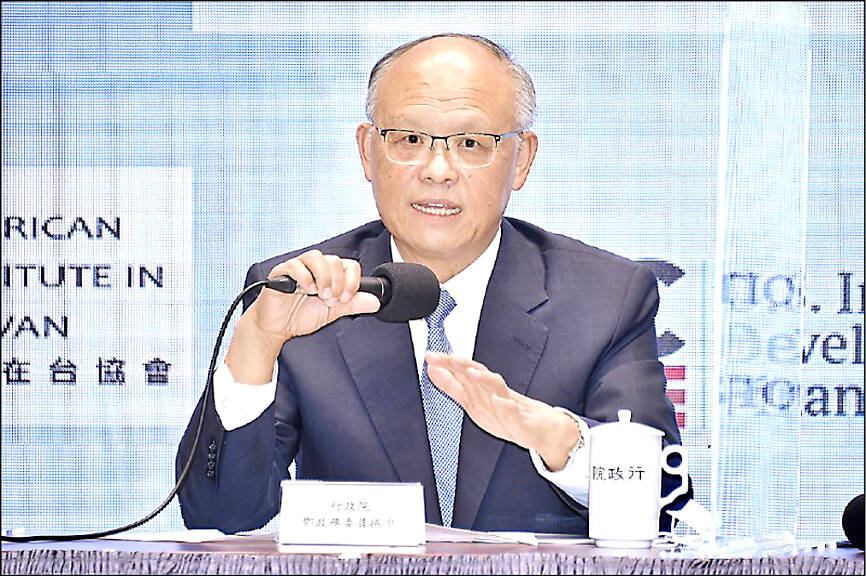Taiwan’s top trade negotiator and a senior US trade official on Friday discussed how to proceed with a recently signed trade deal and issues to be addressed in the next stage of talks, the government said.
Minister Without Portfolio John Deng (鄧振中), who heads the Executive Yuan’s Office of Trade Negotiations, held a virtual meeting with Deputy US Trade Representative (USTR) Sarah Bianchi, exchanging information on the two sides’ preparations to implement the first agreement signed under the US-Taiwan Initiative on 21st-Century Trade, Deng’s office said in a statement released on Friday.
Taiwan mainly sought to understand what would happen when the US Congress passes the trade agreement signed on June 1, the statement said.

Photo: Taipei Times file
Taipei and Washington need to notify each other when all required domestic procedures are completed, with the trade agreement taking effect the day after both notifications are made.
Deng and Bianchi agreed to implement the first agreement in a timely manner and touched on topics in the next stage of the trade talks, the statement said.
There are seven remaining issues under the trade initiative formally launched in August last year, and they involve labor, environment, agriculture, digital trade, standards, state-owned enterprises, and nonmarket policies and practices, it said.
No date has been set for when the next stage of negotiations would start, but the issues set to be discussed are the environment, labor and agriculture, it added.
The first agreement signed in June covers trade facilitation, good regulatory practices, anti-corruption, domestic regulation of services, and small and medium-sized enterprises, the USTR office said.

Taiwanese can file complaints with the Tourism Administration to report travel agencies if their activities caused termination of a person’s citizenship, Mainland Affairs Council Minister Chiu Chui-cheng (邱垂正) said yesterday, after a podcaster highlighted a case in which a person’s citizenship was canceled for receiving a single-use Chinese passport to enter Russia. The council is aware of incidents in which people who signed up through Chinese travel agencies for tours of Russia were told they could obtain Russian visas and fast-track border clearance, Chiu told reporters on the sidelines of an event in Taipei. However, the travel agencies actually applied

Japanese footwear brand Onitsuka Tiger today issued a public apology and said it has suspended an employee amid allegations that the staff member discriminated against a Vietnamese customer at its Taipei 101 store. Posting on the social media platform Threads yesterday, a user said that an employee at the store said that “those shoes are very expensive” when her friend, who is a migrant worker from Vietnam, asked for assistance. The employee then ignored her until she asked again, to which she replied: "We don't have a size 37." The post had amassed nearly 26,000 likes and 916 comments as of this

New measures aimed at making Taiwan more attractive to foreign professionals came into effect this month, the National Development Council said yesterday. Among the changes, international students at Taiwanese universities would be able to work in Taiwan without a work permit in the two years after they graduate, explainer materials provided by the council said. In addition, foreign nationals who graduated from one of the world’s top 200 universities within the past five years can also apply for a two-year open work permit. Previously, those graduates would have needed to apply for a work permit using point-based criteria or have a Taiwanese company

The Shilin District Prosecutors’ Office yesterday indicted two Taiwanese and issued a wanted notice for Pete Liu (劉作虎), founder of Shenzhen-based smartphone manufacturer OnePlus Technology Co (萬普拉斯科技), for allegedly contravening the Act Governing Relations Between the People of the Taiwan Area and the Mainland Area (臺灣地區與大陸地區人民關係條例) by poaching 70 engineers in Taiwan. Liu allegedly traveled to Taiwan at the end of 2014 and met with a Taiwanese man surnamed Lin (林) to discuss establishing a mobile software research and development (R&D) team in Taiwan, prosecutors said. Without approval from the government, Lin, following Liu’s instructions, recruited more than 70 software